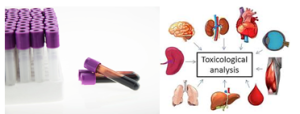DEPARTMENT OF FORENSIC SCIENCE
Forensic science is the use of scientific methods or expertise to investigate crimes or examine evidence that might be presented in a court of law. In CGCLA Forensic Science Department plays a vital role in criminal justice system as it provides scientific information through laboratory analysis of various samples. The Department of Forensic Science composed by three (3) Divisions named Forensic Toxicology, Forensic Chemistry and Forensic Biology. All the mentioned divisions have well equipped laboratory for carrying out various analysis.
Overall Functions of this Department
· To conduct scientific examination, analysis, evaluation and interpretation of forensic samples
· To provide evidence in a legally admissible form to the law enforcements
· To conduct and encourage researches to expand forensic science services
· To provide educational programs and materials to stakeholders of our services
· To provide scientific advice and consultancy
· To deals with the department risks.
Forensic toxicology is a highly specialized area of forensic science which requires expertise in analytical chemistry, pharmacology, biochemistry, and forensic investigation. Forensic toxicology is a broad science that integrates principles and practices about toxicology and legal aspects.

The Functions of Toxicology DIVISION
· To perform toxicological testing in foods, biological and environmental samples
· To quantify the confirmed poisons
· To interpret the toxicological results to determine the cause of harms or death
· To analyze biological samples for the presence of alcohol in traffic cases
· To carry out research on toxicology topics
· To give testimony in court of law as an expert witness
· To inform stakeholders on samples handling
· To perform toxicological analysis on any issues of national or public concern
· To create, validate and evaluate laboratory techniques or methods
Deoxyribonucleic Acid (DNA) is hereditary materials tha code from the parents to the offsprings.

DNA FOUND IN DIFFERENT SAMPLES
Blood Siemens Bones Root hair Saliva Nails Urines and feces Teeth Personal objects like clothes, brushes, razor blades, knives, phones, etc.

FUNCTIONS OF FORENSIC BIOLOGY DIVISION (DNA)
· Carry out analysis of paternity
· Carry out analysis to identify the suspects of criminal cases like rape
· Perform out analysis to identify disasters victims.
· Perform researches associated with DNA
· Conduct consultancy and trainings relating with DNA
Forensic chemistry is the scientific study which use of Chemistry to support litigation in Civil and Criminal Law Cases. The Forensic Chemistry Division in CGCLA plays a vital role in analysis of illicit drugs and related controlled substances.

FUNCTIONS OF FORENSIC CHEMISTRY DIVISION
· To perform laboratory analysis of suspected materials (controlled substances)
· To carry out analysis of liquid samples and liquid formulations on suspected samples
· To analyze food stuffs to determine the presence or absence of controlled substances
· To analyze biological specimens like urine and blood for controlled substances
· Quantify the confirmed illicit drugs
· Give expert witness in the court of law
· Carry out research activities
· Carry out analysis on any matter of national or public interest
· Develop, validate, verify and review laboratory Methods
· Carry out disposal of biological samples
· Participate in Proficient Testing (PT)
· Provide advisory services on any matter related to Forensic Chemistry
